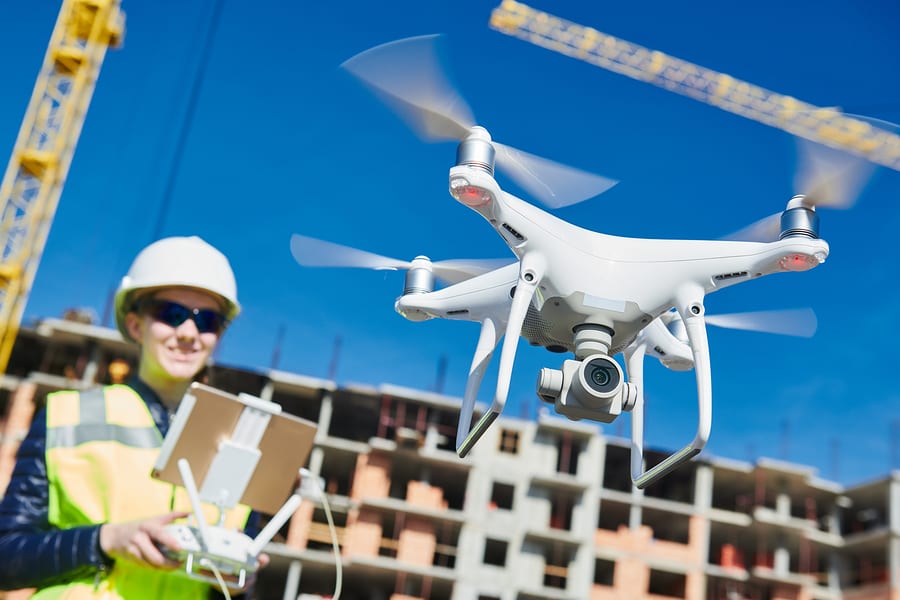In the age of information overload, it can be hard to tell which trends are going to have a lasting impact on the construction industry. However, there are always a few standouts that are poised to revolutionize the industry as we know it.
Let’s dive in.
Drones
The construction industry isn’t being shy about adopting drones — in fact, the sector is the largest and fastest growing user base for the technology. Industry adoption rose a staggering 239% from 2017 to 2018.
Here are just some of the ways construction firms are putting unmanned aerial vehicles (UAVs) to work on site:
- Survey data collection
- Real-time mapping
- Site risk mitigation
- Project progress tracking
- Building inspections
It’s unlikely that using drones is a passing trend, as they can significantly cut labor costs and time spent on rigorous tasks. If you’re looking to introduce drones into your projects, you can go one of two ways:
- Dive in head first. Invest in a drone and operator licensing for one or more of your workers. You can find a guide on getting licensed here. This is an excellent route for large, well-established firms.
- Dip your toes in. Hire a consultant that owns and operates its own UAVs. A big benefit here is not having to worry about securing insurance.
Recommended reading: 6 Ways Drones Are Affecting the Construction Industry
Offsite construction
Offsite, or modular, construction is a trend that’s poised to change the face of the construction industry — especially given that technology has boosted both efficiency of the process and quality of the final product. As one article explained the takeoff, “high tech has met construction, and the marriage has investors salivating.” Investors poured a massive $1.24 billion in prefabrication start-ups just in the first three quarters of 2018.
Benefits of offsite construction include:
- Provides a controlled environment (reduces site hazards)
- Speeds up construction times (lowers operational costs)
- Reduces need for skilled workers (relieves the pressure for seeking talent)
- Eliminates weather delays (enables fewer schedule setbacks)
Recommended reading: Forget the Big Bang – it’s the big offsite construction boom that deserves your attention
Labor shortage
It’s impossible to discuss the current and future state of the construction industry without mentioning the ongoing labor shortage. The vast majority — nearly 80% — of firms say they want to expand their workforce this year. However, 78% say they’re having a hard time filling salaried and hourly craft positions.
In many cases, firms being short on talent causes costs to rise and schedules to get behind — a lose-lose for everyone involved in the project. As such, construction companies are having to get aggressive with their talent search and employee retention strategies.
In a recent survey, firms reported employing these initiatives to combat the issue:
- 63% plan to increase investments in training and development this year
- 59% increased base pay rates
- 29% provided incentives and/or bonuses
- 24% increased contributions or improved employee benefits
For more ideas on getting top talent in the door, check out this article: Key Strategies for Attracting Talent in the Construction Industry
Mobile technology
Mobile technology isn’t a new trend, but it has undoubtedly advanced rapidly in the last decade (in 2009, Blackberries were still one of the most popular phones on the market!). And since there are so many moving parts in every construction project, it makes sense that the industry is continuing to integrate mobile technology in everyday operations. One survey showed that 80% of construction professionals said mobile technology is of “high priority.”
Smartphones, tablets, and smartwatches, plus sophisticated industry-specific tools like mobile GPS instruments, apps, and personal safety monitors are taking the construction world by storm. Here are a few ways construction professionals are using mobile devices:
- Improving communication
- Expediting data collection and reporting
- Enabling real-time collaboration
- Boosting worker accountability
- Monitoring site conditions
- Managing bids, work plans, schedules, and change orders
Ready to get your next environmental project started? Get in touch with our environmental experts today.

Recommended reading: 5 Ways mobile technology is revolutionizing the construction industry

